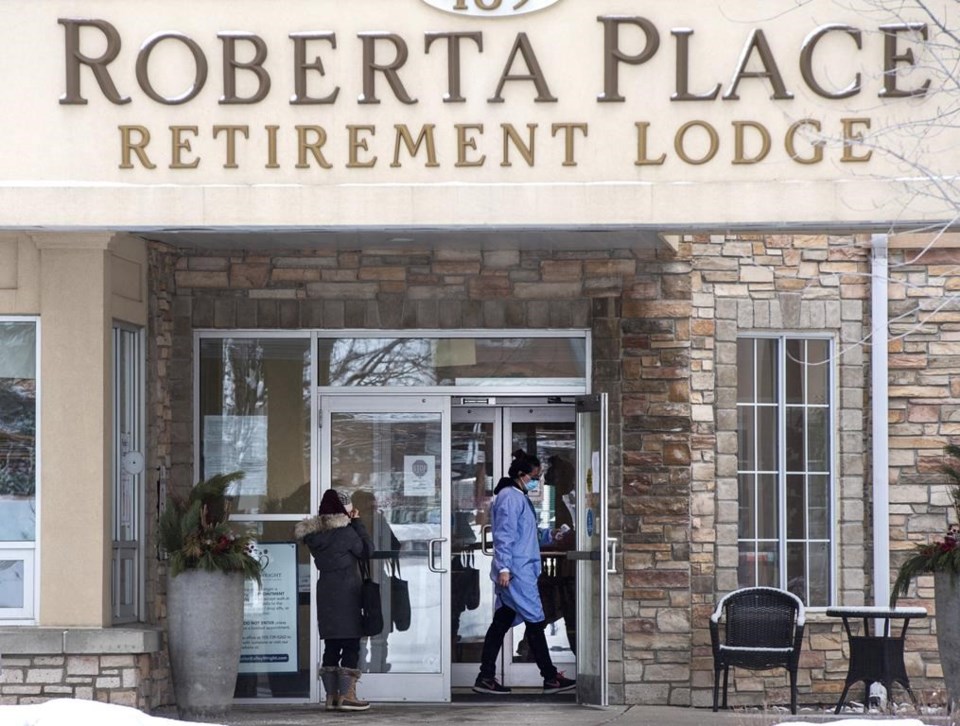TORONTO — Public health officials in Ontario are taking further measures to trace a more contagious strain of COVID-19 that's been found in a number of regions since it was first detected in the Toronto area a month ago.
As of Monday, 38 cases of the new variant, which was first reported in the U.K. late last year, had been confirmed in the province.
The new variant is deemed to have caused a deadly outbreak at a long-term care home in Barrie, Ont., that has infected more than 200 people. The local public health unit was investigating whether it was a factor in another regional care home outbreak.
The head of microbiology and laboratory science at Public Health Ontario said a clearer picture of the variant's prevalence would emerge in the coming days.
Dr. Vanessa Allen said all positive results from COVID-19 tests taken in the province on Jan. 20 will be assessed by public health to give a snapshot of the variant's prevalence.
Public Health Ontario is also deploying tests to find possible cases of the "variants of concern" before sending them up for genomic screening, which can take days, Allen said. The screening test is focusing on cases considered "high-risk" for the mutations, such as aggressive outbreaks known as "superspreader events" and cases affecting known travellers.
"The goal based on the data right now is to do everything we can to contain every single case we find and increase our capacity to find them, recognizing that we still don't have the full picture because we have not tested everybody to date," Allen said.
Dr. David Williams, the province's top doctor, said people should remain vigilant and continue taking precautions like wearing masks and physical distancing to avoid infection.
"We're going to have to be on our guard," he said.
Health Minister Christine Elliott said Monday that the province is testing samples to look for three new variants -- separate strains that first emerged in the U.K., South Africa and Brazil -- to determine where they are and how they spread.
So far, only the U.K. variant had been found in Ontario. Cases had been confirmed by public health units covering Toronto, Ottawa, York, Durham and Peel regions, as well as Simcoe, Middlesex-London and the Kingston area as of Monday.
Elliott said the province had tested more than 9,000 samples for the new variants as of Monday, and is aiming to assess 1,500 samples per week starting next week.
"We are very much on top of it and we are detecting it very quickly so that we'll know how to deal with different geographic areas where it may show up," Elliott told a news conference.
Confirming its first case of the U.K. variant on Monday, the Kingston, Frontenac and Lennox and Addington health unit advised anyone who had recently travelled or had visitors from outside the region to consider getting an asymptomatic test for COVID-19.
The region's top doctor said with the new variant now in the area, it's "crucial" to make changes to COVID-19 control strategies to find and isolate cases early and prevent outbreaks.
The public health unit is expanding the criteria for contacts considered to have high risk of exposure -- now including anyone who was not wearing a mask and less than two metres from someone with a confirmed infection.
Simcoe Muskoka District Health, which had confirmed seven cases of the U.K. variant, announced a strategy Monday with similar measures aimed at mitigating spread.
Measures include more frequent testing for residents, visitors and staff at care homes dealing with outbreaks where the variant is suspected -- currently two care homes in the region.
The U.K. variant has been confirmed by Simcoe Muskoka health officials as "the causative agent" in the outbreak at Roberta Place, in Barrie, Ont., after six cases were confirmed in samples.
The seventh individual with a confirmed case of the new strain was a close contact of someone infected in another outbreak at a long-term care home in Bradford, Ont. Public health officials were still investigating the link on Monday.
The public health unit said 44 residents at Roberta Place had died from COVID-19, and the outbreak had infected 127 residents and 86 staff.
Five other people assisting with the outbreak had been infected, the health officials said Monday, including two essential caregivers. One of the caregivers had died from the illness.
Ten cases of the U.K. variant had also been confirmed in Toronto, the local health unit reported.
Meanwhile, Premier Doug Ford called for stricter border measures including mandatory testing at entry points to keep new strains of the illness out.
"I can't emphasize enough: close down our borders and make sure anyone that's coming in gets tested," Ford said Monday.
This report by The Canadian Press was first published Jan. 25, 2021.
Holly McKenzie-Sutter, The Canadian Press

